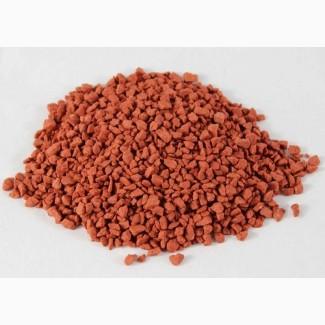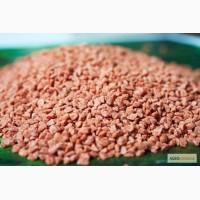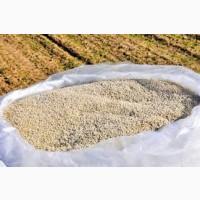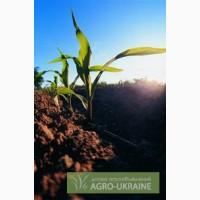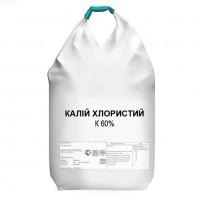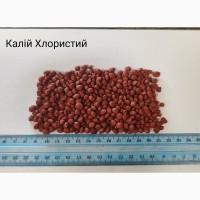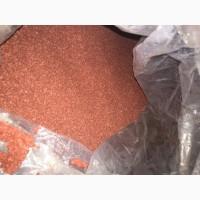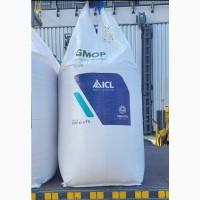Sell / buy
Kaliy Khloristy, Vinnytsia region.
Price10,650 UAH .
Region:
Vinnytsia region.
Updated:
Гранулированное простое концентрированное калийное удобрение.
Potassium chloride is a crystalline salt or granules of white and pink color with good physical properties. It is low-hygroscopic, does not stick, and disperses easily.
According to the method of processing sylvinite ore, flotation and halurgic are distinguished.
Can be treated with reagents and dust suppressors
In the world, among the entire assortment of potassiumfertilized, it is potassium chloride that is used the most - about 80-90%.
Physical and chemical indicators
The equivalent of potassium oxide, K2O, % min.60
Potassium chloride, KCl, % min.9(//tractor-service.com)
Moisture content, H2O, % max. 0.5
Experiments have proven that potassium is an important element of nutrition, which ensures, with sufficient nitrogen and phosphorus fertilization, an increase in the yield of grain and green mass.
Potassium is a necessary element for all plants, its consumption per unit of the formed crop is much higher than that of other elements of mineral nutrition.
Potassium is a functional element that takes part in the main physiological processes of plants.
Potassium contributes to the normal course of photosynthesis, increases the flow of carbohydrates from the leaf plates to other organs, helps plants absorb moisture more effectively and reduces evaporation. Under the influence of potassium, the leaves acquire the ability to retain water and tolerate short-term drought more easily.
Potassium is considered a "quality element" for crop production, it has a positive effect on the quality of production: root crops increase the sugar content,potatoes -starch content, spinning crops - fiber yield and quality, fodder plants - protein content.
Thus, potassium contributes to the growth of productivity, of course, provided that production technology is followed and other necessary nutrients are used.
Potassium chloride is used for self-application and as a raw material for the production of fat mixtures.
Delivery by railway and motor vehicle is possible.
Potassium chloride is a crystalline salt or granules of white and pink color with good physical properties. It is low-hygroscopic, does not stick, and disperses easily.
According to the method of processing sylvinite ore, flotation and halurgic are distinguished.
Can be treated with reagents and dust suppressors
In the world, among the entire assortment of potassiumfertilized, it is potassium chloride that is used the most - about 80-90%.
Physical and chemical indicators
The equivalent of potassium oxide, K2O, % min.60
Potassium chloride, KCl, % min.9(//tractor-service.com)
Moisture content, H2O, % max. 0.5
Experiments have proven that potassium is an important element of nutrition, which ensures, with sufficient nitrogen and phosphorus fertilization, an increase in the yield of grain and green mass.
Potassium is a necessary element for all plants, its consumption per unit of the formed crop is much higher than that of other elements of mineral nutrition.
Potassium is a functional element that takes part in the main physiological processes of plants.
Potassium contributes to the normal course of photosynthesis, increases the flow of carbohydrates from the leaf plates to other organs, helps plants absorb moisture more effectively and reduces evaporation. Under the influence of potassium, the leaves acquire the ability to retain water and tolerate short-term drought more easily.
Potassium is considered a "quality element" for crop production, it has a positive effect on the quality of production: root crops increase the sugar content,potatoes -starch content, spinning crops - fiber yield and quality, fodder plants - protein content.
Thus, potassium contributes to the growth of productivity, of course, provided that production technology is followed and other necessary nutrients are used.
Potassium chloride is used for self-application and as a raw material for the production of fat mixtures.
Delivery by railway and motor vehicle is possible.
|
Author, contacts | |
Agrolyga TD, LLC/ відгуки, інфо./ activity evaluation | |
|
Phone:
+38(xxxxxx
show
| |
| Skype: alexey77586 | |
| http://www.agro-liga .com | |
All user ads ~56 | |
Ad ID: #903410
(added by registered user, registration date: 2013-06-08)
Added / Updated: 10-10-2024 16:45| ||248
(current, until: 10-10-2025)
Permanent Ad Address:
Impressions / views for today: ?, total: ?
Similar ads
There are many interesting...
